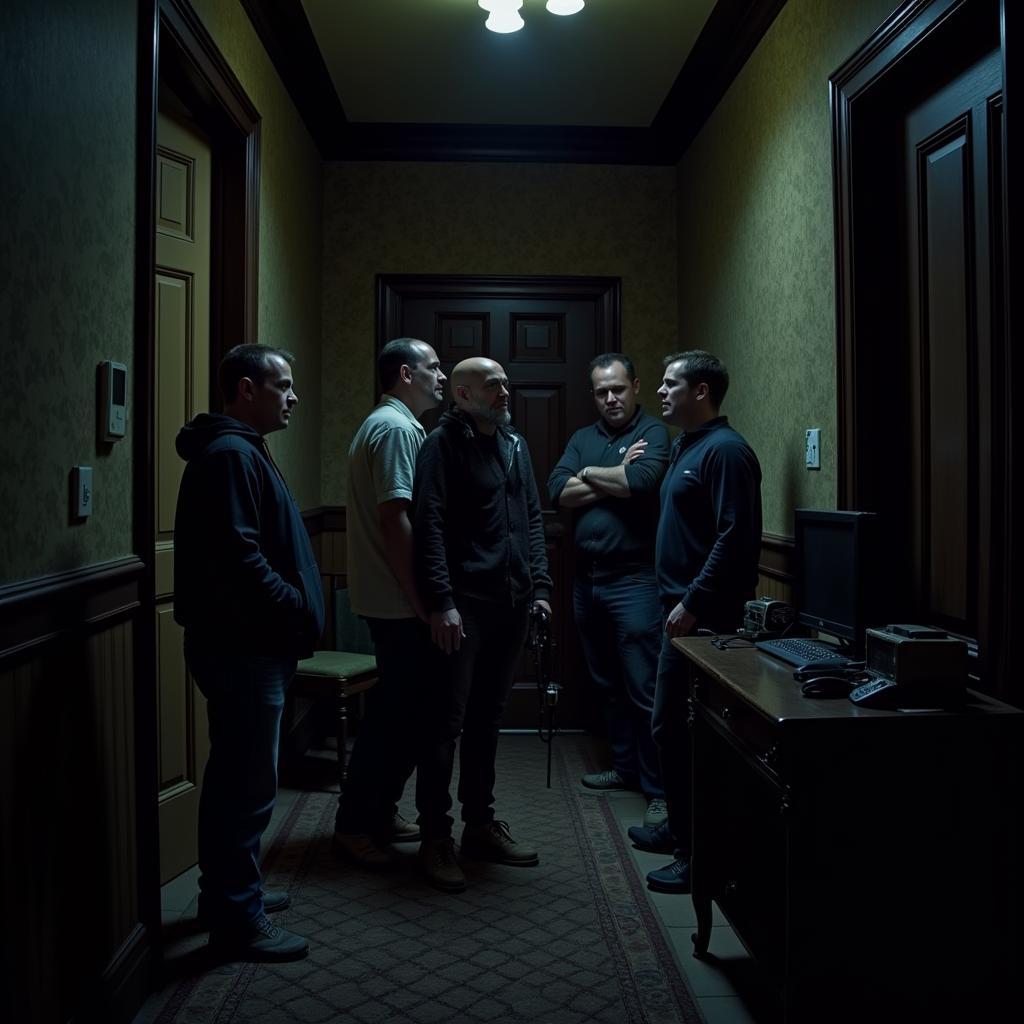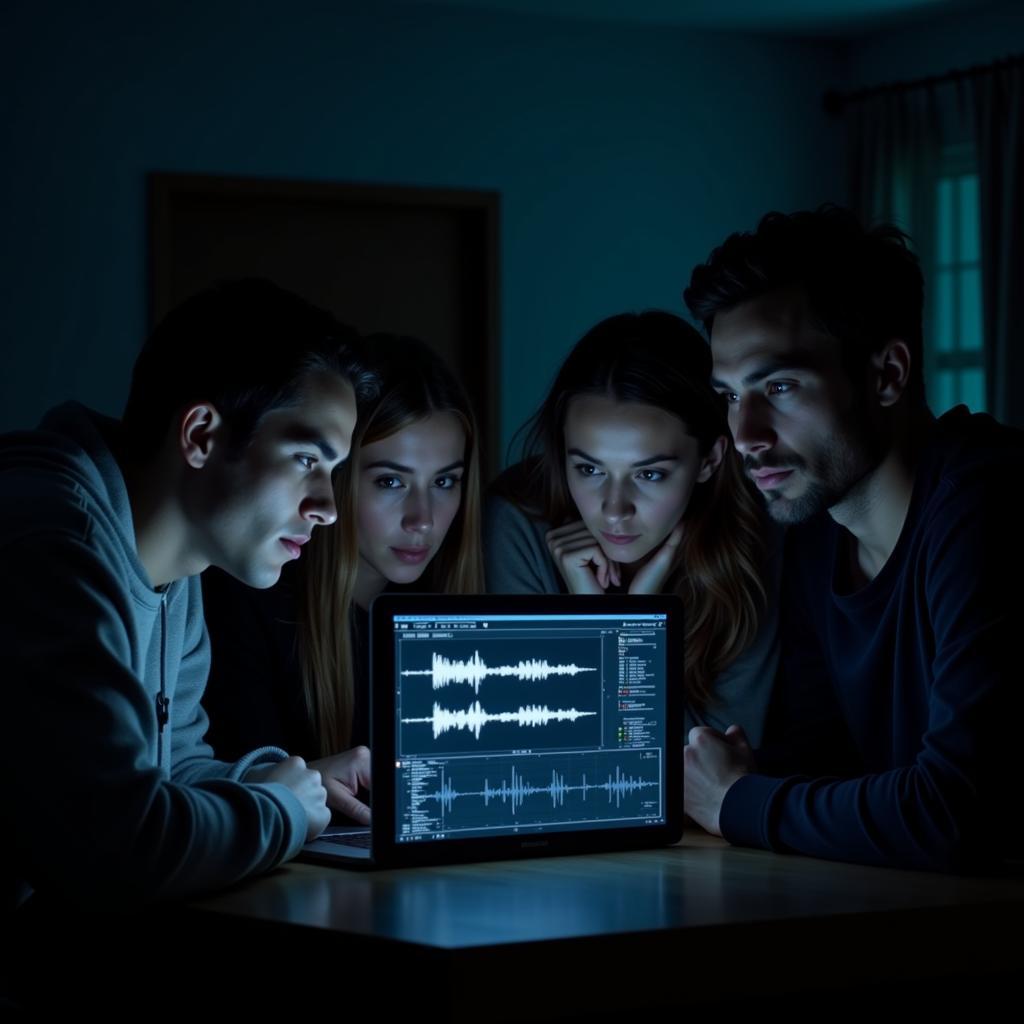In any field, the phrase “Context Of The Research” is crucial, but it takes on a special significance in the world of paranormal research. This isn’t about simple lab experiments; we’re dealing with unexplained phenomena, personal experiences, and beliefs that often defy traditional scientific methods. So, understanding the context becomes key to conducting meaningful research and interpreting results.
Why Context is King in Paranormal Investigations
Imagine investigating a haunted house. You could just bring in your EMF readers and EVP recorders, hoping for a blip on a screen. But without context, those blips are just that – meaningless noise.
 Paranormal Researchers Investigating a Haunted House
Paranormal Researchers Investigating a Haunted House
Now, imagine you learn the house belonged to a sea captain who tragically lost his family at sea. Suddenly, the cold spot in the attic, corresponding to where he used to keep his nautical charts, becomes more significant. The whispers picked up on the EVP, sounding like crashing waves, gain a chilling relevance.
That’s the power of context. It provides the framework upon which we build our investigations and interpret our findings. It allows us to:
- Formulate relevant research questions: Instead of just asking “Are there ghosts here?” we can ask more specific questions like, “Does the sea captain’s presence manifest near objects related to his maritime life?”
- Select appropriate methods: Knowing the history and reported phenomena might lead us to prioritize EVP sessions over temperature readings, or vice versa.
- Analyze data meaningfully: Context helps us separate genuine paranormal activity from environmental factors or equipment malfunctions.
- Draw more informed conclusions: While we may never have definitive “proof,” contextualized research allows for stronger inferences and deeper understanding.
Key Aspects of “Context of the Research”
So, what constitutes this crucial context? Here are some key areas:
-
Historical Context: Understanding the history of a location, person, or object involved in the paranormal is crucial. This includes researching historical records, news articles, personal accounts, and even local folklore.
-
Psychological Context: The beliefs, expectations, and psychological states of both the researchers and witnesses can significantly influence experiences and perceptions. Factors like sleep deprivation, stress, or pre-existing beliefs can shape what people see and hear.
-
Environmental Context: The physical environment plays a vital role. Electromagnetic fields, infrasound, and even the presence of certain molds can induce hallucinations or mimic paranormal experiences.
 Paranormal Research Team Analyzing Data
Paranormal Research Team Analyzing Data
- Sociocultural Context: Cultural beliefs, folklore, and even religious practices can shape how individuals interpret and report paranormal events. What might be considered a demonic haunting in one culture could be a benevolent ancestor spirit in another.
Contextual Research: A More Nuanced Approach
Considering these various contexts is not about debunking the paranormal. Instead, it’s about approaching investigations with a more critical and nuanced lens.
For instance, context in research involving a reported demonic possession might lead us to explore psychological or even medical factors alongside potential spiritual explanations. Or, when studying a historic battleground, understanding the contextual research of the battle and its aftermath could provide insights into the types of paranormal activity reported.
Conclusion: Context is Key to Unlocking Paranormal Mysteries
In the realm of paranormal research, context is not just an add-on; it’s the foundation. By carefully considering the historical, psychological, environmental, and sociocultural contexts surrounding an investigation, we can ask better questions, utilize appropriate methods, and arrive at more meaningful interpretations of our findings. Ultimately, a solid understanding of “context of the research” brings us closer to unraveling the mysteries of the unknown.
FAQs About “Context of the Research”
-
Q: Does considering context mean dismissing all paranormal phenomena as explainable?
A: No, it simply means approaching investigations with a more critical and well-rounded perspective, considering all possible explanations. -
Q: How can I find reliable historical information for my research?
A: Utilize a variety of sources like libraries, historical societies, online databases, and even local newspapers. -
Q: Is it important to disclose personal beliefs about the paranormal during an investigation?
A: Transparency is key. Acknowledging potential biases helps maintain objectivity and allows for a more balanced interpretation of findings.
Need Help with Your Paranormal Research?
Contact us! Our team at Paranormal Research is here to assist you.
Phone: 0904826292
Email: research@gmail.com
Address: No. 31, Alley 142/7, P. Phú Viên, Bồ Đề, Long Biên, Hà Nội, Việt Nam
We are available 24/7 to answer your questions and provide guidance.
Explore more:
Let’s unlock the secrets of the paranormal together.